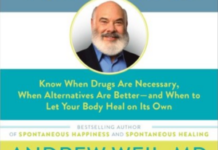Screening Instruments Do Not Reflect Individual Experiences of Depression
Researchers detect discrepancies between the language used to describe lived experiences of mental health and the language used in modern screening tools.
RAISE Study Out Of Sync With Media Reports
Writing on his 1 Boring Old Man blog, Dr. Mickey Nardo reflects on the media frenzy around the RAISE study and asks why the prescription data has not been released. He adds skepticism about the political motives of the potentially overblown results, which he sees as a clear push for increased mental health funding.
“Maybe Companies Should Chill on Employee-Happiness Programs”
Will Davies, author of The Happiness Industry, does a Q&A on the ways companies are misusing psychological research on happiness. “I think that one thing that often gets lost in lots of the discussions of happiness (especially in the business world) is the possibility that happy work may mean less work.”
Teen Raising Awareness After Exercise Saved her Life
From Elite Daily: Courtney Lorking, an 18-year-old online wellness coach and fitness enthusiast, is speaking out and sharing her story of how exercise helped her...
Vail Place Focuses on Collective Work for Mental Health
Minn Post did a feature story last week on Vail Place, an alternative mental health treatment center run on a community “clubhouse” model where the nearly 900 members and staff work side by side to run the center’s activities. Vail Place was founded in Hopkins, Minnesota in the early eighties by mental health activists and family members as a community for psychosocial rehabilitation. “The work isn’t therapy,” a member explains. “It’s growth. It’s ‘I cans’ rather than ‘I can'ts.’ And that’s important for mental health and survival.”
Light Therapy Outperforms Prozac for Depression
In a new study, researchers found that bright light therapy was an effective treatment for nonseasonal major depressive disorder (MDD) while Prozac (Fluoxetine) alone...
Mindfulness Therapy May Be More Effective Without Antidepressants
While an estimated 74-percent of patients diagnosed with major depression receive a prescription for an antidepressant, new research reveals that mindfulness-based cognitive therapy (MBCT)...
Childhood Anxiety Disorders Are Treatable With Therapies
From MinnPost: According to psychologist Hal Pickett, childhood anxiety is best reduced through self-care and common-sense therapies such as getting enough sleep, maintaining a balanced...
“Psychiatry’s Mind-Brain Problem”
A New York Times Op-Ed by Cornell psychiatry professor George Makari connects the surprise over the results of the widely-covered RAISE study to American psychiatry’s shift toward pharmacology and the oversimplification of disorders as brain diseases.
“Brain Changes Seen in Veterans with PTSD after Mindfulness Training”
Veterans with PTSD experience observable changes to the brain after mindfulness training, according to new research published in Depression and Anxiety. “The brain findings suggest...
When Anxiety or Depression Masks a Medical Problem
From The New York Times: The mind and body are more connected than we often think — symptoms of anxiety and depression may result from...
Upcoming Breath-Body-Mind Online Workshop
Psychiatrists Richard Brown and Patricia Gerbarg will be giving a Breath~Body~Mind workshop live online August 16 and August 17, 2014. According to a press...
Yes, Your Sleep Schedule is Making you Sick
From The New York Times: Clinicians have long known that sleep schedules and levels of exposure to sunlight can have a significant impact on...
“Culturally Specific Treatment Center Knows That One Approach Doesn’t Work for All”
"What was going on inside Turning Point was an experiment: a community-based treatment center designed to serve low-income African-Americans. After a few bumpy early...
Study Explores Correlates of Low-Level Physical Activity and Psychosis
A study examines the variables correlated with low levels of physical activity in persons diagnosed with psychosis in low and middle-income countries
Call For Abstracts: Philosophical Perspectives on Critical Psychiatry
The Association for Advancement in Philosophy and Psychiatry is issuing a call for abstracts, with a particular interest in submissions from service users. The...
“The Psychologists Take Power”
Tamsin Shaw, writing in the New York Review of Books, summarizes the most recent trends in psychology and moral judgement. From Skinner’s behaviorism to...
Letters to the Editor: “The Treatment of Choice”
Readers respond to the New York Times article, “The Treatment of Choice,” about innovative programs for psychosis and schizophrenia that involve patients and their families in treatment decisions. “Narratives of success counter a drumbeat of faulty links of mental illness and violence, inaccuracies which serve only to further stigmatize and isolate individuals with psychiatric illness.”
“Does Psychotherapy Research with Trauma Survivors Underestimate the Patient-Therapist Relationship?”
Joan Cook, professor of Psychology at Yale, writes than in her work with military veterans she realized that her psychotherapy techniques mattered much less than her training had indicated. Instead, what mattered was “the bond forged over years of therapy,” known as “the therapeutic alliance.”
“Doctors Say Exercise Can Relieve Depression Symptoms”
“Doctors say one of the best anti-depressants isn't even a drug, it's exercise,” CNN reports. “Experts say many cases of depression can be treated effectively with, for example, a pair of running shoes.”
Critical Psychiatry: Importance of Interviewing
For the Critical Psychiatry blog, Duncan Double writes that psychological formulation and psychosocial assessment may provide a way forward to a “new psychiatry” that moves on from modern concepts of mental illness as chemical imbalance or some other abnormality of the brain.
“Medication for Schizophrenia: Less is More?”
Neuroskeptic weighs in on the controversy over the lack of antipsychotic dose data in the RAISE study and the misleading media coverage. He points out that one of the treatment interventions was a computerized medication management system called COMPASS, which recommends doctors use lower doses than they otherwise might.
Webinar Discussion – Rethinking Madness
A free recording of last week's webinar anchored to Phil Borges' Crazywise, a documentary exploring alternative approaches to mental health, is now available. Over 4,000 people...
“Programs Expand Schizophrenic Patients’ Role in Their Own Care”
Benedict Carey at the New York Times covers the push for new programs that emphasize supportive services, therapy, school and work assistance, and family education, rather than simply drug treatment.
Dr. Andrew Weil Says We’re Taking Too Many Medicines
From The New York Times: According to Dr. Andrew Weil, who is best known for popularizing the concept of integrative medicine, the problem of overmedication...

















